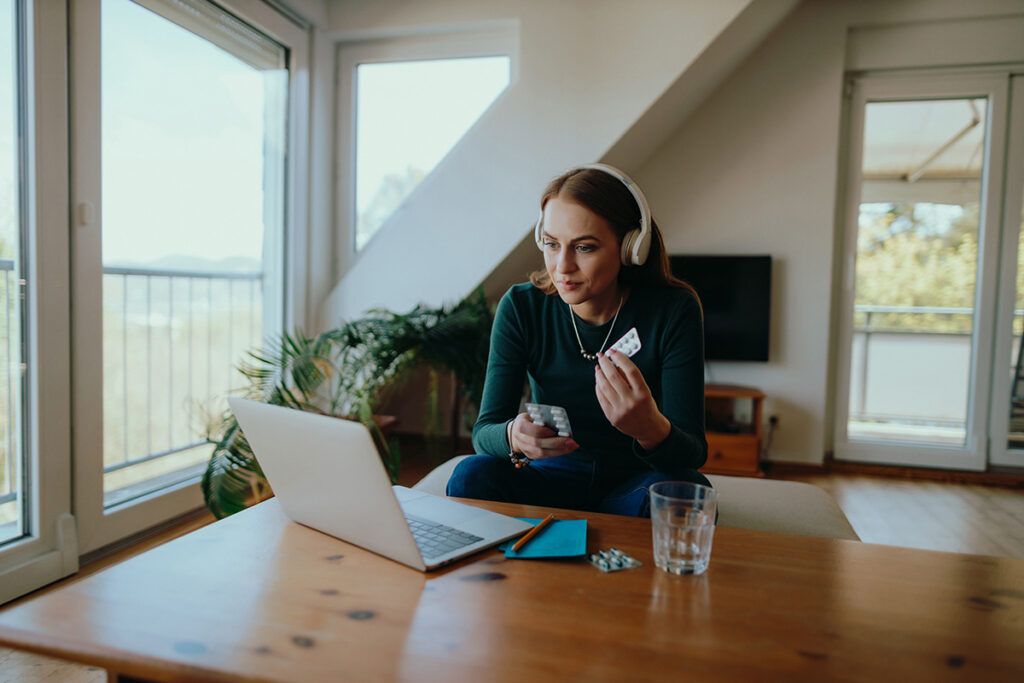An antidepressant medication aims to balance specific chemicals in the brain, known as neurotransmitters, to improve your mood.
Not all antidepressants are created equal, though. Some may offer relief faster than others and may be suitable for depression that does not improve with traditional medications or other approaches.
Do all antidepressants work immediately?

No, antidepressants do not typically work instantly. These medications gradually modify brain chemistry and neurotransmitter levels. This process takes weeks to produce noticeable effects on how you feel and act.
While individual responses to antidepressants may vary, most people may notice some symptom relief within 2 weeks.
However, more significant effects may take up to 6 weeks. But some new antidepressants may offer relief in a few days or weeks.
Consider asking your healthcare professional about newer antidepressants if you are concerned about how fast your medication is working.
Switching to a new drug or stopping your medication without your doctor’s supervision is not recommended. It may worsen your symptoms and cause additional side effects.
List of most common fast-acting antidepressants
Fast-acting antidepressants may provide relatively quicker symptom relief compared to traditional antidepressants.
A healthcare professional may choose to prescribe a fast-acting antidepressant if you experience severe symptoms or other medications have not been effective. They will advise on the best way to gradually switch you to a new drug to avoid possible withdrawal effects.
Fast-acting antidepressants that may provide relief within 2 weeks or sooner may include:
Esketamine
Esketamine (Spravato) is an NMDA receptor antagonist. It is FDA-approved as a fast-acting medication for depression. It is available as a nasal spray, and a doctor will administer this at their office or clinic.
Esketamine is often used with oral antidepressants to manage depression that has not responded to any other medications. It may also effectively treat major depressive disorder (MDD) that involves severe symptoms, like thoughts of suicide.
Esketamine is a Schedule III controlled substance, which means it has a moderate likelihood of physical and psychological dependence. Treating depression with esketamine requires close and regular medical supervision.
Common side effects may include:
- dizziness
- nausea
- headaches
Severe side effects may include:
- disassociation (a feeling of detachment from yourself and your surroundings)
- increased chance of thoughts and attempts of suicide
- high blood pressure
- sedation
- bladder problems
Ketamine
Although approved by the FDA as an anesthetic, ketamine has shown promise as a fast-acting medication for severe depression and other mental health conditions. However, it is not FDA-approved for depression, which means they have not validated how safe and effective the drug is for this use.
The use of ketamine for depression requires close medical supervision and may be a short-term alternative for severe cases.
Ketamine (Ketalar) is available in two medication forms: intravenous (IV) infusion and intranasal spray.
Common side effects may include:
- dizziness
- nausea
- sedation
- poor coordination
Although rare, it may also cause mental confusion, disassociation, hallucinations, and bladder problems.
Dextromethorphan-bupropion
Dextromethorphan-bupropion (Auvelity) is the newest FDA-approved fast-acting antidepressant medication.
Auvelity is a combination of a cough suppressant (dextromethorphan) and a traditional antidepressant (bupropion). The combined medication is useful for treating MDD and may offer symptom relief in 1 week.
Common side effects may include:
- dizziness
- dry mouth
- diarrhea
- sleepiness
- sexual dysfunction
Rare side effects may include:
- seizures
- anxiety
- fatigue
- joint pain
- high blood pressure
- serotonin syndrome
- glaucoma
If you need help covering the cost of medications, the free Optum Perks Discount Card could help you save up to 80% on prescription drugs. Follow the links on drug names for savings on that medication, or search for a specific drug here.
